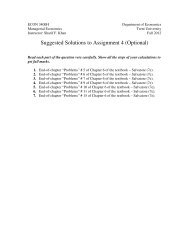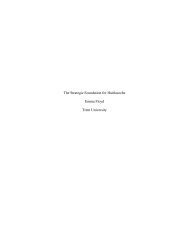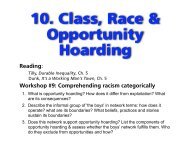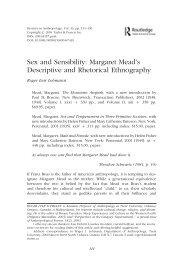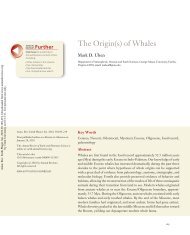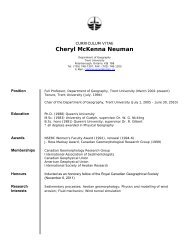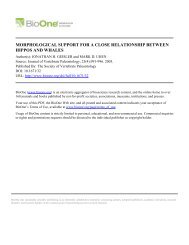REO FORTUNE'S PSYCHOLOGICAL THEORY OF CULTURAL ...
REO FORTUNE'S PSYCHOLOGICAL THEORY OF CULTURAL ...
REO FORTUNE'S PSYCHOLOGICAL THEORY OF CULTURAL ...
You also want an ePaper? Increase the reach of your titles
YUMPU automatically turns print PDFs into web optimized ePapers that Google loves.
290 Pacifi c Studies, Vol. 32, Nos. 2/3—June/Sept. 2009<br />
toward living personalities whom they saw as both helpful and harmful to<br />
their own interests.<br />
Reminiscent of his earlier point that dreams reveal submergent attitudes<br />
rejected in waking life, Fortune referred to Manus dreams as showcasing<br />
“a deeper attitude” of distaste toward one’s own protector ghost, who on<br />
the surface was honored as benevolent. In this connection, one man told<br />
Fortune that he “dreamt of his Sir Ghost saying to another, ‘Now let’s go<br />
kill a good man,’ and both laughed at the project” (Fortune 1935, 21).<br />
Fortune expected to find ambivalent and complex attitudes in individuals<br />
toward hegemonic dogma and decorum.<br />
For the Manus, something seen in a dream was a real occurrence, so<br />
this was a revelation of hidden truth, confirming an air of suspicion that Sir<br />
Ghosts are not to be trusted. However, this did not contradict the belief<br />
that a Sir Ghost could also protect: “Manus children are not subjected to<br />
religious pressure. Faith and belief are taken for granted” (Fortune 1935,<br />
5). This seems a far cry from an agnostic pacifist’s struggles with Godand-country<br />
militaristic rhetoric in New Zealand during the Great War.<br />
Deeper ambivalences of this sort may simply not have come to Fortune’s<br />
attention during his stay among the Manus.<br />
Another point of religious uncertainty explored by Fortune among the<br />
Manus is their beliefs surrounding the causes of death. Sins of the living<br />
could motivate a judgmental Sir Ghost to punish the household with illness,<br />
and if the sin was not confessed and reparations paid, death of a member<br />
might result:<br />
In this way popular opinion becomes standardised, and sin is<br />
generally stressed as the cause of death, mortal sin, not ghostly<br />
malice, although individual oracles are continually making individual<br />
exceptions to try to save sinners’ faces, and their own faces also.<br />
(Fortune 1935, 24; see also p. 56)<br />
So here are ambivalences over the ways one assigns cause and effect for<br />
others’, as opposed to one’s own, matters. Fortune was clearly aware of the<br />
rough spots and inconsistencies in both his own and Manus models of their<br />
society, though he did not explore these issues through intimate dream<br />
analysis.<br />
Nevertheless, Fortune’s attention was firmly fixed on ambivalent beliefs<br />
among the Manus, as still another example shows. He reported that the<br />
Manus incompletely borrowed religious and magical beliefs of the neighboring<br />
inland Usiai people, including notions of “tchinal . . . mischievous<br />
land ogres . . . [and] magical familiars of the land dwellers of the Great<br />
pacs-32-02-06.indd 290 9/7/2009 2:32:34 PM



